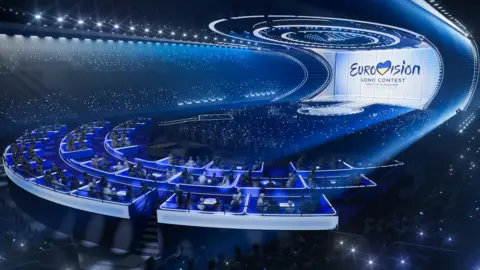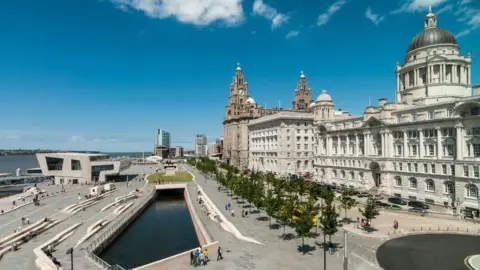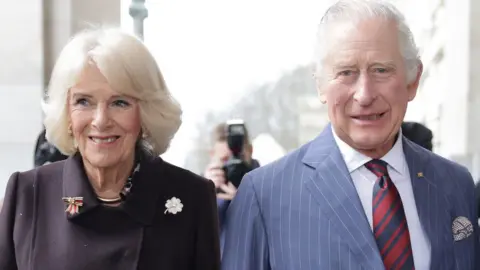Eurovision 2023: Final batch of tickets sell in an hour
 Corinne Cumming
Corinne CummingThe majority of a final batch of tickets for next month's Eurovision Song Contest in Liverpool have sold out, the BBC has confirmed.
A "limited number" of tickets for three live shows and six production previews went on sale at 12:00 BST.
Just over an hour later, the BBC said only a small number remained available.
These are mostly single seats and hospitality packages for previews and rehearsals. Both of the semi-finals and the grand final are now sold out.
In March the initial batch of tickets was snapped up in 90 minutes, leaving thousands of fans disappointed.
On Monday, many waited again in an online queue, hoping to get their hands on the last remaining tickets.
In a post on Twitter at 13:25 BST, BBC Eurovision said: "The majority of Eurovision 2023 tickets that went on sale today have now been sold.
"A small number of tickets are still available to purchase for some shows.
"For those of you with tickets, we'll see you in Liverpool. And to everyone else, we'll see you on BBC One!"

It will be the first time the has UK hosted the annual competition in 25 years.
About 6,000 fans will be inside the arena for each of the shows. Prices ranged from £90 to £290 for the live semi-finals and from £160 to £380 for the live grand final.
Preview shows ranged from £30 to £280.
A preview show is a full run-through of the TV broadcast that doubles up as a production rehearsal, with all the acts performing live in the arena.
There are six preview shows and three live shows.
How do the semi-finals work?
All competing broadcasters pay a fee to take part in Eurovision (see below for more details); but with only 26 slots available in the grand final, there has to be a knock-out stage. That takes the form of two-semi finals, which this year take place on Tuesday 9 and Thursday 11 May.
Ten songs from each of the two qualifying rounds go through to the final.
A handful of countries, known as the big five (France, Germany, Italy, Spain, and the UK), automatically get a place in the final because they contribute more money to the staging of the contest.
Last year's winner also qualifies without participating in the semi-finals. This year, that honour goes to Ukraine.


What if I didn't get a ticket?
The city of Liverpool has announced multiple events around this year's Eurovision Song Contest.
There will be a two-week festival taking place, including a submarine parade and a rave which will take place simultaneously in Kyiv.
 Liverpool City Council
Liverpool City CouncilClose to the M&S Bank Arena will be the Eurovision village, the official fan zone of the contest for thousands of people.
During the televised live shows, fans will be able to watch both semi-finals and the final (which is ticketed) on big screens there.
It is also where some of the acts will perform on stage across the week.
There will also be extensive coverage across the BBC.
Who pays for Eurovision?
The UK government has put forward £10m towards the cost of hosting the song contest for things like security and visa arrangements.
It says the vast majority will be spent on "showcasing Ukrainian culture" but would not give further details. In comparison, the Italian government did not pay anything towards the event last year.
 PA Media
PA MediaLocal authorities in Liverpool have also pledged £4m for the event, which is £6m less than officials put forward in Turin in 2022.
The bulk of the cost will fall to the BBC which is expected to put forward between £8m and £17m as host broadcaster.
The 37 broadcasters taking part all pay a fee to enter, which in recent years has totalled a combined sum of about £5m. The BBC does not make its contribution public.

All the build-up, insights and analysis is explored each week on a BBC podcast called Eurovisioncast.
Eurovisioncast is available on BBC Sounds, or search wherever you get your podcasts from.

